- Home
- Parnell Hall
Actor Page 4
Actor Read online
Page 4
And you know what? When she did, it went better.
I take no credit for Act Two. My character only comes in at the very end, has no blocking and only a couple of lines. But in Act Three he’s on most of the time, including one long scene with Raina, in which it turns out she’s made a bit of a fool of herself over him, sending him her picture inscribed “Raina, to her Chocolate Cream Soldier.” When this comes out she’s embarrassed and he kids her about it. She is thoroughly exasperated with him, but he is blithely unruffled and continues to have great fun at her expense.
I can’t begin to tell you how well that scene went.
At any rate, by the time we finished up it was only three in the morning. If one can use the word only to refer to such a time. Act Three had taken two and a half hours. That may seem like a lot, but it was a breeze compared to the five hours we put in on Act One.
And for my money, it was in a lot better shape. Not that I knew the lines—I was doing the whole thing on the book, which was one reason it flowed so well. But that didn’t really bother me. Now that I knew the lines would come with the blocking, they were the least of my worries. The hell with the lines, all I wanted to do was play the scene the best I could.
I assure you I did.
At any rate, by three o’clock we were all ready to hang it up, pack it in and who could blame us?
Herbie had to drive me home. The house where I was staying was only a couple of blocks away and I could have walked it if I’d known where it was, but Herbie hadn’t shown me my room yet. It occurred to me at that late hour that this was just another example of Herbie doing everything ass-backwards. Any other person would have gotten me squared away first, instead of dragging me straight off to rehearsal. But no, as we climbed into Herbie’s station wagon I noticed my suitcase still sitting in plain view in the back. In New York City, that suitcase would not have lasted a half hour, and I wondered if even here in Connecticut, leaving a suitcase in plain view in an unlocked car—for so the station wagon proved to be—was entirely kosher. I do know if that suitcase had been gone I’d have been ripshit.
As it was, I was none too pleased. Herbie’s little fling with Margie had put him way at the top of my shit list. It wasn’t just that he was stepping out on his wife and kids and making a fool of himself over a hopelessly younger woman—though that was certainly part of it. It was also that his passivity during rehearsal, which I had put down to incompetence, was no longer necessarily an indication of his being a bad director, but now had all the earmarks of his letting a pushy young actress wrap him around her finger and walk all over him. And all at my expense. So I would have to say, at that moment, Herbie and Margie were far from my favorite fan couple.
He had to drive her home too, of course. I wondered how he planned to get me out of the car and keep her in it, which I was sure was his intention. But that was no problem. It turned out we were staying at different houses, and he simply dropped me off first. He left her in the car, grabbed my suitcase and ushered me into a relatively large, wood-framed building. At least relatively large was my impression—though at that time in the morning my usually razor-sharp powers of observation were not that keen. It was larger than his house and smaller than the theater, and that’s as far as I’d care to go. We went inside, up some stairs, down a hallway and into a room on the left.
A room that had all the comfort and cheer of my dressing room. A bed, a table, a lamp, a dresser and that’s it.
Herbie plopped down the suitcase, straightened up and gave me an almost guilty look. I wondered if he suspected I was onto his little game with Margie-poo in the car outside. But it appeared he was only concerned with the accommodations, because he said, “I know it’s not much, but it was such short notice, and then you won’t be here that often. If it’s a problem ...”
“It’s no problem, Herbie. No problem at all.”
He seemed genuinely relieved. “Thanks, Stanley. Thanks a lot,” he said. Then he turned and hurried out the door.
I stood, looked around. The room looked just as bad as it had before. Worse, in that I couldn’t see the door of a closet. All right, no big deal, I don’t need a—
Shit.
No closet door meant no bathroom door either. Which meant sharing a bathroom down the hall.
Wonderful.
The room did have a window. I went to it, looked out, and saw Herbie’s station wagon pulling out the driveway and heading down the road. Great, Herbie. Run off to your paramour’s bungalow. I sure hope she has running water.
I was really steamed. By now I was feeling uncharitable enough about Herbie to suspect that his abrupt exit, which I had originally attributed to a desire to get back to Margie, was actually motivated by his haste to get away before I noticed I didn’t have a bathroom.
You never need something so much as when you don’t have it. It occurred to me right then it had been a long rehearsal and I really could have used a bathroom. It also occurred to me that that made twice running that looking for a bathroom had really pissed me off.
No pun intended.
I went out in the hall to find it. There were a number of doors, but it figured to be the one facing me at the end. I sure hoped it was. If it turned out to be on another floor, I was going to be really ripshit.
Some of the rooms I passed had the doors open and the lights on, but no one appeared to be in evidence. That puzzled me at first. Then I remembered. These guys were much younger than me. When I was their age and doing summer theater I stayed out all night carousing too. It was a depressing note that I’d become such an old fogy that such an explanation hadn’t immediately occurred to me.
I went down the hall and located the bathroom, which consisted of a toilet, a sink and a stall shower, which I realized I was going to have to fight for there being so many rooms on this floor.
I finished in the bathroom and went back to my luxurious accommodations. I had a big day ahead of me. Time for some well-earned rest.
Only I wasn’t the least bit tired. I was in fact all keyed up from rehearsal, and all bummed out from not having a bathroom, and all pissed off at dear old Herbie, and much as I knew I ought to be tired, the fact is I was wide awake.
Plus it was kind of spooky being alone at three in the morning in a big, empty house.
I went outside and looked around. There was no moon, and aside from the lights from the house there was only a faint glow off to the left. I figured that could be only one thing, and set off for it. I figured right. After a block and a half I could see the playhouse, glowing like a beacon in the night.
There’s nothing quite like a summer theater on strike night. The town around it is dark and dead, and yet here in the midst of it is this incredible beehive of activity.
A quiet beehive. As I walked up to the theater I couldn’t see a soul. The doors were all open and the lights were all on, but there was no one in sight. Which could mean only one thing. The set was already inside.
I walked around the side of the theater. Sure enough, there on the side wall was a loading dock some six feet high and, above it, wide-open double doors leading to the stage. Light was pouring out the double doors, and I walked closer and tried to get a peek in, but it was too high. All I could see was a patch of blue in the very back, which I assumed was the cyc.
I heard the sound of footsteps on gravel and looked around to see two figures approaching from out of the darkness. They were marching with their hands over their heads, which gave them a surreal appearance, made them look like two soldiers surrendering to no one in particular. As they came into the light, they proved to be two apprentice boys carrying a black masking flat. They took no notice of me, just plodded right by with the listless tread of those who had been working all night. They heaved the flat up onto the loading dock, then clomped off into the darkness again, obviously back to the scene shop in search of another flat.
I watched them go, then went back to the front of the building and up the steps to the lobby. Naturally, the box
office was closed and there was no one there. The doors to the auditorium were closed also. I pulled one open, slipped inside.
I found myself in total darkness. What the hell? There were lights on all over the place.
Then I heard a voice from the stage bellow, “Six A, damn it.”
From above, an adolescent voice said, “Sorry, sorry, gotta get to the booth.”
There came a clomping up above, then a crash and a small cry, followed by the adolescent voice again, “Just a minute, just a minute, I can’t see. Hold on.”
More clomping, and suddenly a light went on, a Leko, which seemed to be aimed down around the fourth or fifth row of the audience. In the glow behind it I could see the silhouette of a man standing on the stage.
“Damn it, Ridley,” the man said. “Where the hell’s Tom?”
“He took a break.”
“We’re never gonna get finished if you have to keep running back and forth. I need someone in the booth.”
“It’s all right. That was an accident. The circuit just blew.”
“That’s not six A?”
“It will be. I just replugged it to aim it.”
I heard footsteps overhead during this exchange, lighter and less clumpy, since Ridley wasn’t moving in the dark, and now the spotlight on the fourth row of the audience jumped, swiveled and then tilted up to illuminate the figure on the stage. He was a burly man in sneakers, shorts and a T-shirt, who only needed a whistle around his neck to pass as a football coach. Obviously the tech director, whose name for the life of me I couldn’t remember—I’m terrible with names.
“Okay, hit me with the hot spot,” he said. “Up a little. A little bit stage right. Hold it there. Fine. Lock it off, shutter it off the proscenium.”
There was a pause, then the sound of metal on metal, which would be Ridley locking off the light with a wrench. That stirred unpleasant memories—he hadn’t locked off the other one very well—and I instinctively looked up apprehensively, even though I was under the overhanging balcony, out of harm’s way.
I looked back up at the stage. What I’d seen through the loading doors was indeed the blue of the cyc. The set the tech director was standing in front of was an exterior, the garden set for Act Two. That made it the one that least concerned me, since I only come in at the end. Still, I was curious enough that I would have liked to have taken a closer look, if it hadn’t been for Ridley hanging Lekos overhead. I knew that was stupid—lightning doesn’t strike twice in the same place, and the odds of me getting hit by a second Leko the same night had to be astronomical—still, there was no way I was walking under where Ridley was working.
I went back in the lobby and downstairs to the dressing rooms. The greenroom was full of apprentices. At one end, two boys and a girl were assembling set pieces—tables, desks, bookcases, what have you, to use in the show. Two girls were sitting on the floor sewing a curtain. And a few apprentices were simply sitting on chairs and appeared to be sneaking a break.
None of them gave me a second look. I knew how they felt. I’d been an apprentice myself way back when. So these kids had my sincerest sympathy.
I walked around and looked down the hallway I’d seen before, the one with the two bathrooms and the door beyond them where I thought I’d seen a star. Yeah, there was a star all right. The door was shut, but I turned the knob and pushed it open. I groped on the wall and turned on the light.
Well, you son of a bitch.
This dressing room was slightly different. It had plush furniture, including a comfortable chair, a mini-refrigerator and a TV It also had its own bathroom complete with shower. Compared to the other dressing rooms it was the Ritz.
Was I pissed? Well, under any other circumstances I would not have been. But, as I said, my character Bluntschli is the star of the show. The Man of Arms and the Man. By rights the star dressing room goes to the actor playing Bluntschli. Not to the actress playing Raina.
Unless she’s sleeping with the director.
As it was, I was ripshit. I don’t know if I was going to do anything about it, being a basically easygoing type, but by that point I was just programmed to be ripshit.
I stomped out of the star’s dressing room and discovered a screen door right across the hall. Not the kind you immediately think of, but a wire-mesh chicken-wire-type screen door. It had a hasp and padlock which was unlocked now, so I could have opened the door if I’d wanted to, but there was no need. The light inside was on and I could see right through the chicken wire.
It was the prop room. Inside was a wide metal-shelf unit with the shelves labeled for the various shows. There was one labeled Zoo Story, one labeled White Whore, and others labeled Act One, Act Two, and Act Three, which held the props we would be using for Arms and the Man. On the Act One shelf I saw the pistol I would climb through the balcony window with and aim at Margie-poo.
Considering the dressing-room situation, she was lucky it wouldn’t be loaded.
Stupid me. For a moment I’d wondered why Herbie hadn’t shown me the prop room. But if he had, I’d have seen the star’s dressing room.
Oh well. I had enough to worry about without such petty considerations. I turned, walked on down the hall.
And into the costume shop. Where three more zombie apprentice girls sat sewing costumes in the company of a rather pleasant-looking, middle-aged woman.
The woman squinted up over the bifocals she wore down over her nose and around her neck on a chain. “Can I help you?” she said.
“Not really,” I said. “I didn’t mean to intrude. I’m Stanley Hastings. I’m filling in in the show.”
Her eyes lit up. “You’re Captain Bluntschli?”
“That’s right.”
She got out of her chair and actually grabbed me by the arm. “Come in, come in,” she said. “This is fortunate. I’m so glad you came by.” She led me over to a rack in the corner, talking a mile a minute. “They gave me your measurements, but they’re not always accurate, are they?” She looked at me slyly. “An extra piece of pie and that thirty-six waist just doesn’t make it anymore. And two full costumes you need time to alter.”
She grabbed a costume off the rack. A soldier’s uniform, ratty and torn. “Here we are. Act One.” She handed it to me. “Try it on.”
“Oh. Should I take it to my dressing room?”
She waved her hand. “Please. You’re wearing underpants, aren’t you? We’re all family here.”
She included the teenage girls in her wave. I looked at them, thinking they might giggle at that. But no, they sat sewing blindly.
“Fine,” I said.
I kicked off my sneakers, pulled off my pants and pulled on the trousers from the costume. I tried to button them. They were snug.
She batted my hands away from the button, took hold of it herself nodded her head up and down. “You see?” she said. “It’s like I told you. You could suck your stomach in and get this done, and maybe it holds and maybe it doesn’t. Maybe it pops some night onstage when you sit down. That’s why I give you another inch. Here, take ’em off.”
“You want me to try on the other pair?”
She shook her head. “It’s the same fit, I’ll give you another inch.”
“How about the jacket and the shirt?”
She shrugged. “Sleeve lengths don’t change and you don’t have a double chin. You’re not so fat the shirt won’t fit, so they’re fine. Slip the coat on if you want. It doesn’t button, so no big deal.”
I put the coat on. It fit fine. I suddenly realized I was standing there in an army coat and my underwear. In a summer theater that didn’t seem particularly strange. I took the coat off, handed it back to her, pulled on my pants.
“Glad you came by,” she said. “Now I’ll have it ready for the dress. What did you say your name was?”
“Stanley Hastings.” I smiled. “And you’re the woman with no last name.”
She looked at me. “Who told you that? I have a last name. Anne. Mary Anne.”
>
Okay. Served me right. So much for joking with a woman you just met at three-thirty in the morning. I excused myself, found my way out the door and continued on my secret mission, which was to sneak a peek at the set without Ridley dropping a light on my head.
I went up the side stairs to the stage. The work lights were out, so it was dark in the wings. The only light was coming from a spot onstage. I crept between two masking flats and peered out.
The tech director was standing in the light, shouting to Ridley as before. “Up a little. To the right. To the right.Stage right, Ridley. Not my right. That’s it. Right there. Now down a hair.”
A hand clamped down on my shoulder.
I jumped a mile and almost peed in my pants. After all, it was the middle of the night, I was strung out beyond endurance and this was the very stage where I almost got bopped on the head. I came down, whirled around and gawked.
Staring at me from the shadow of the wings was an apparition, a ghostlike figure obviously sent by some vengeful god to rid me of whatever was left of my rapidly depleting faculties. What I saw was gleaming eyes in sunken sockets, a thin protruding nose stuck twixt pale, emaciated cheeks, framed by a fright wig of snow-white hair. Clearly a demon straight from hell.
“Just what do you think you’re doing here?” the demon demanded.
The voice was cultured, clipped and British. Coming from that face it was positively chilling.
I blinked, found myself momentarily incapable of speech.
“Come, come, are you deaf? Who are you and why are you here?”
At that moment my brain clicked over and I realized this must be Goobie Wheatly. Associating that name with that face was too much for me. I smiled. “You’re the stage manager,” I said.
He looked at me as if I were an idiot. “I know who I am,” he said. “Who are you?”
“Oh,” I said. “I’m Stanley Hastings. I’m taking over the part of Captain Bluntschli.”
That statement did not press Goobie Wheatly’s cordial button.
“I thought so,” he said. “Why are you here?”

 Clicker Training
Clicker Training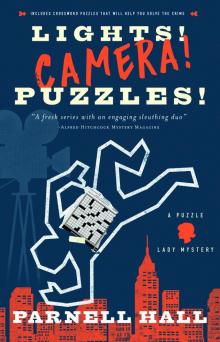 Lights! Camera! Puzzles!
Lights! Camera! Puzzles!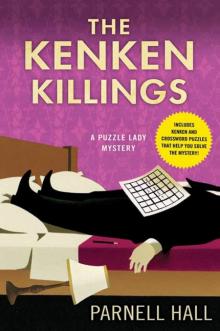 The KenKen Killings
The KenKen Killings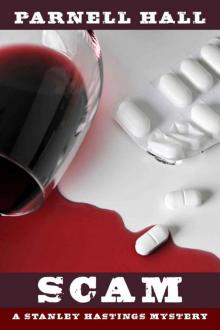 12-Scam
12-Scam The Puzzle Lady vs. the Sudoku Lady
The Puzzle Lady vs. the Sudoku Lady 2 Murder
2 Murder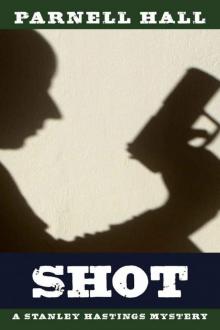 7 Shot
7 Shot You Have the Right to Remain Puzzled
You Have the Right to Remain Puzzled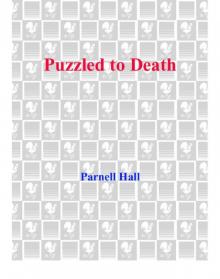 Puzzled to Death
Puzzled to Death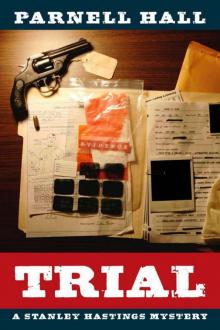 11-Trial
11-Trial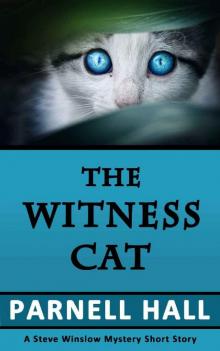 The Witness Cat (Steve Winslow Mystery)
The Witness Cat (Steve Winslow Mystery) With This Puzzle, I Thee Kill
With This Puzzle, I Thee Kill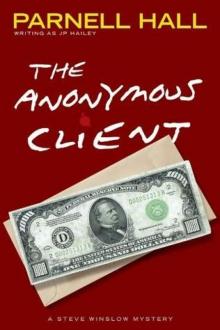 The Anonymous Client sw-2
The Anonymous Client sw-2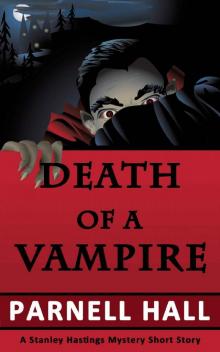 Death of a Vampire (Stanley Hastings Mystery, A Short Story)
Death of a Vampire (Stanley Hastings Mystery, A Short Story)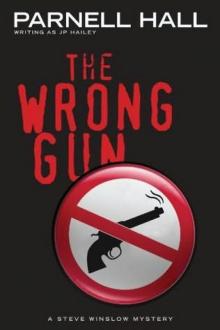 The Wrong Gun sw-5
The Wrong Gun sw-5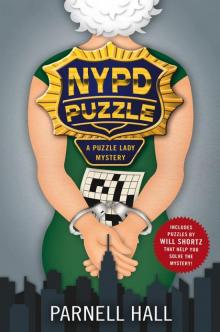 NYPD Puzzle
NYPD Puzzle 6 Juror
6 Juror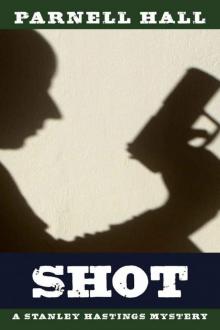 07-Shot
07-Shot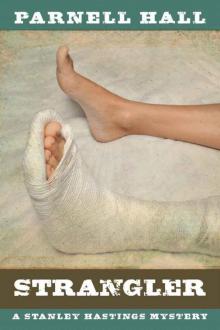 04-Strangler
04-Strangler 02-Murder
02-Murder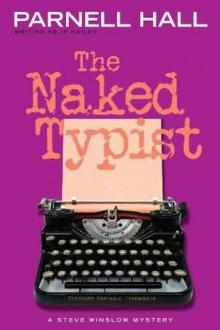 SW04 - The Naked Typist
SW04 - The Naked Typist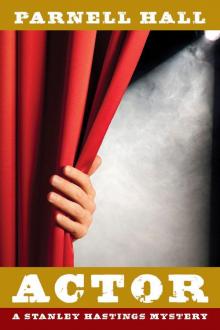 Actor
Actor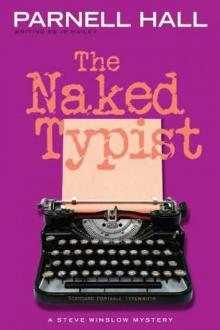 The Naked Typist sw-4
The Naked Typist sw-4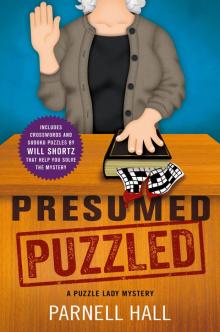 Presumed Puzzled
Presumed Puzzled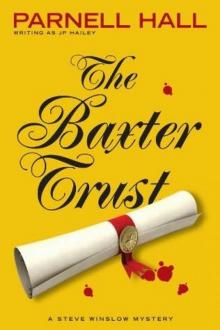 SW01 - The Baxter Trust
SW01 - The Baxter Trust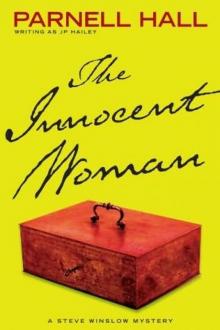 SW06 - The Innocent Woman
SW06 - The Innocent Woman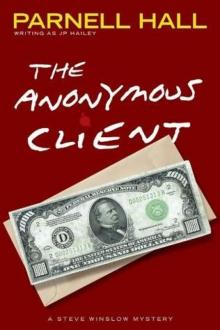 SW02 - The Anonymous Client
SW02 - The Anonymous Client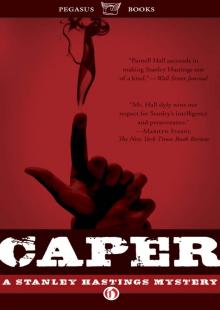 Caper
Caper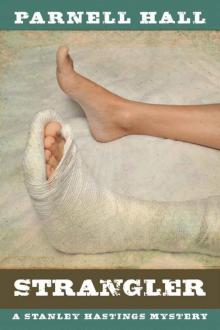 4 Strangler
4 Strangler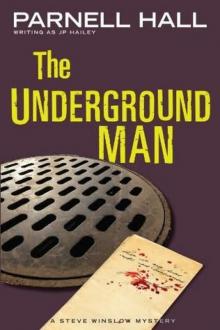 The Underground Man sw-3
The Underground Man sw-3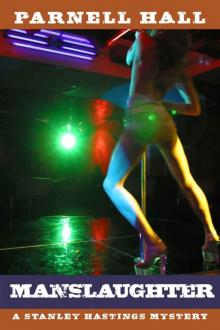 Manslaughter (Stanley Hastings Mystery, #15)
Manslaughter (Stanley Hastings Mystery, #15)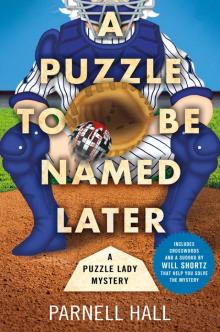 A Puzzle to Be Named Later--A Puzzle Lady Mystery
A Puzzle to Be Named Later--A Puzzle Lady Mystery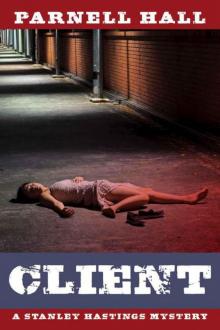 05-Client
05-Client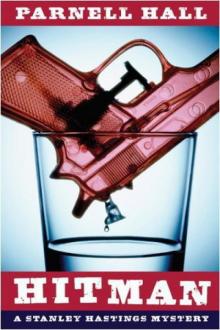 16 Hitman
16 Hitman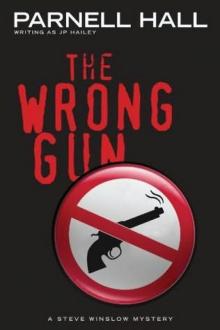 SW05 - The Wrong Gun
SW05 - The Wrong Gun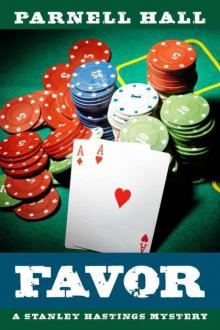 3 Favor
3 Favor Last Puzzle & Testament
Last Puzzle & Testament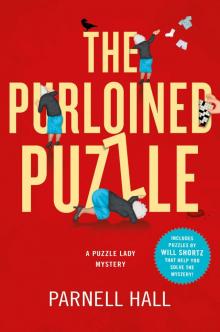 The Purloined Puzzle
The Purloined Puzzle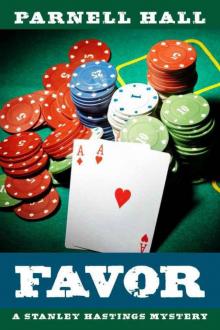 03-Favor
03-Favor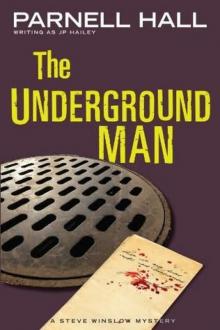 SW03 -The Underground Man
SW03 -The Underground Man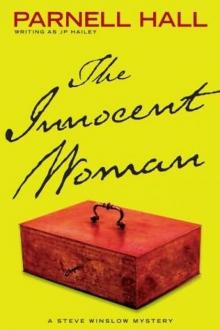 The Innocent Woman sw-6
The Innocent Woman sw-6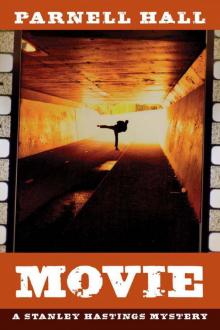 10 Movie
10 Movie 06-Juror
06-Juror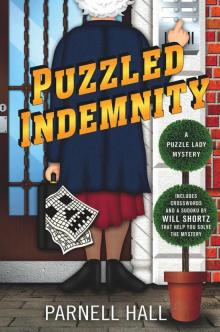 Puzzled Indemnity
Puzzled Indemnity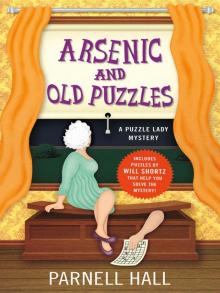 Arsenic and Old Puzzles
Arsenic and Old Puzzles Dead Man's Puzzle
Dead Man's Puzzle Safari
Safari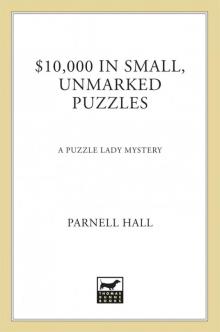 $10,000 in Small, Unmarked Puzzles
$10,000 in Small, Unmarked Puzzles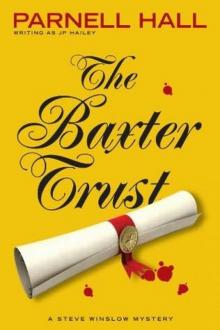 The Baxter Trust sw-1
The Baxter Trust sw-1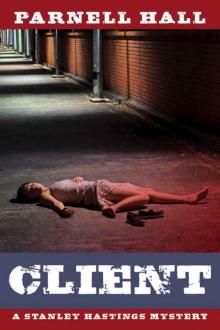 5 Client
5 Client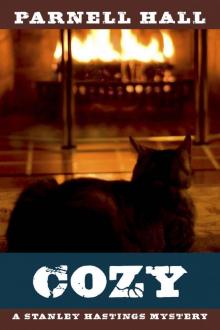 Cozy (Stanley Hastings Mystery, #14)
Cozy (Stanley Hastings Mystery, #14)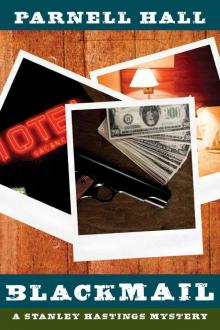 Blackmail
Blackmail A Puzzle in a Pear Tree
A Puzzle in a Pear Tree A Clue for the Puzzle Lady
A Clue for the Puzzle Lady Clicker Training (Stanley Hastings Mystery, A Short Story)
Clicker Training (Stanley Hastings Mystery, A Short Story)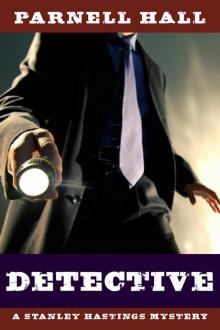 Detective (Stanley Hastings Mystery Book 1)
Detective (Stanley Hastings Mystery Book 1)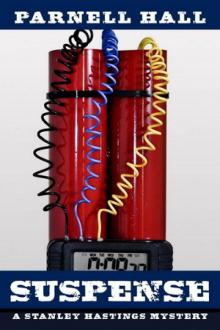 13 Suspense
13 Suspense